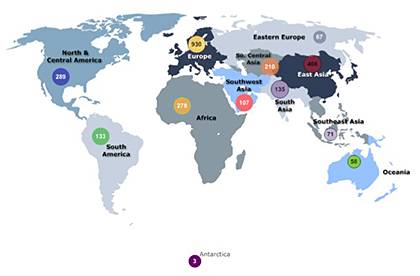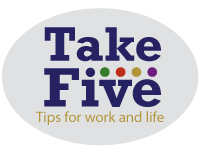Take Five: Tips For Duke's Global Travelers
Steps to take before you travel abroad on Duke business

Kelly Deal, a research analyst at Duke Global Health Institute, travels with a small notebook, receipt book and zippered pouch when she goes abroad on Duke business. Each day, she notes purchases and writes receipts for vendors who don't offer them.
"I keep all the papers in the zippered pouch and worry about sorting out what was personal and what was business when I get home," she said.
Read MoreAs Duke's presence around the world increases, the number of faculty and staff traveling to international destinations for research or programs is rising. In fiscal year 2013, faculty and staff took 2,689 international trips - 763 more than in 2012. To help employees prepare for their trips, Duke offers a website with resources, including an international travel registry.
"We are constantly learning from people who travel and adding to our resource list," said Christy Parrish Michels, senior manager of Global Administrative Policies and Procedures. "It is useful to learn from other people's experience."
Here are five tips, culled from Michels and other frequent flyers, to help smooth your international travels.
Check with the export experts. At least a dozen U.S. government offices have regulations about items and information travelers can or cannot take out of the U.S. For example, it is illegal to leave the U.S. with a computer that has data related to U.S. Department of Defense or NASA technologies, unless that information is in the public domain. Also, a U.S. government export license may be required to take equipment or supplies abroad, especially if you intend to leave them in a foreign country. Mark Stomski, director of Duke's Office of Export Controls, encourages travelers to check with his office well before they travel to see what letters, licenses, or permissions they might need from the various U.S. government agencies. "People are usually surprised at how complex the laws are," he said.

Keep credit flowing. Travelers using the Duke Procurement Card or personal credit cards should notify their banks about travel at least a week in advance. "I can't count the number of calls I've gotten from people who discover their card won't work after the first swipe overseas because the credit card company saw unusual activity and blocked the card to prevent fraud," Michels said.
Get a handle on health issues. Duke's Travel Clinic at Employee Occupational Health and Wellness offers personalized travel-related medical advice along with required vaccinations. If applicable, the clinic can bill your department directly for the cost of work-related health review and vaccinations for international travel. Travelers should also download and carry the CIGNA Medical Benefits Abroad health insurance card. This new supplemental health insurance automatically covers faculty and staff traveling on Duke business, and their dependents, for up to six months. "Many hospitals and clinics in other countries require payment up front for medical care," Michels said. "With the CIGNA coverage, employees shouldn't have to worry about paying out-of-pocket for emergencies or for regular, preventive care."
Tell Duke where you'll be. Register your travel plans and contact information in the confidential Duke International Travel Registry. The registry is used to locate travelers abroad should a natural disaster or crisis associated with civil or political unrest occur at a destination. "We have resources to help people caught up in an emergency, but we can't offer help if we don't know where to find people," said Chris Boroski, director of Duke's Corporate Risk Management. Travelers should also familiarize themselves with the International SOS program, which provides emergency travel assistance to Duke faculty, staff and students when traveling abroad for Duke.